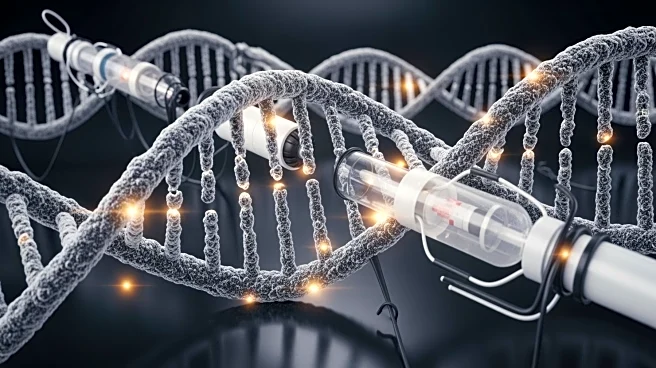What's Happening?
The DNA nanotechnology market is anticipated to grow significantly, with projections estimating its value to reach USD 52.19 billion by 2034. This growth is driven by a compound annual growth rate (CAGR) of 25.12% from 2025 to 2034. The market's expansion
is attributed to advancements in drug delivery systems, data storage, and high-level diagnostics. North America currently dominates the market, holding a 40% share as of 2024, while the structural DNA nanotechnology segment leads with a 67% market share. The dynamic DNA nanotechnology segment is expected to experience the fastest growth. Key applications include drug delivery systems and diagnostics, with the biotechnology and pharmaceutical sectors anticipated to see the highest growth rates.
Why It's Important?
The rapid growth of the DNA nanotechnology market signifies a transformative shift in the healthcare and biotechnology industries. The technology's ability to enable precise drug delivery and early disease detection could revolutionize medical treatments and diagnostics, potentially leading to more effective and personalized healthcare solutions. This growth also highlights increased investment in biotechnology and the push towards tailored medicine, which could drive further innovations and economic opportunities within the sector. Stakeholders in the biotechnology and pharmaceutical industries stand to benefit significantly from these advancements, as they could lead to new therapeutic approaches and improved patient outcomes.
What's Next?
As the DNA nanotechnology market continues to expand, further research and development are expected to focus on overcoming challenges related to manufacturability, stability, and safety, particularly in biomedical applications. The ongoing advancements in DNA nanobots for environmental monitoring and remediation, as well as their potential in nanoscale manufacturing, suggest a broadening of applications beyond healthcare. Stakeholders, including academic and research institutions, are likely to increase their involvement in this field, driving further innovation and potentially leading to new regulatory and ethical considerations as the technology becomes more integrated into various industries.
Beyond the Headlines
The implications of DNA nanotechnology extend beyond immediate market growth, potentially influencing ethical and legal frameworks as the technology becomes more prevalent. The ability to manipulate DNA at a nanoscale level raises questions about privacy, data security, and the potential for misuse. Additionally, the technology's role in environmental monitoring and remediation could lead to significant advancements in sustainability efforts, offering new tools for addressing pollution and climate change. As the market evolves, these broader implications will likely become more prominent in discussions among policymakers, industry leaders, and the public.















